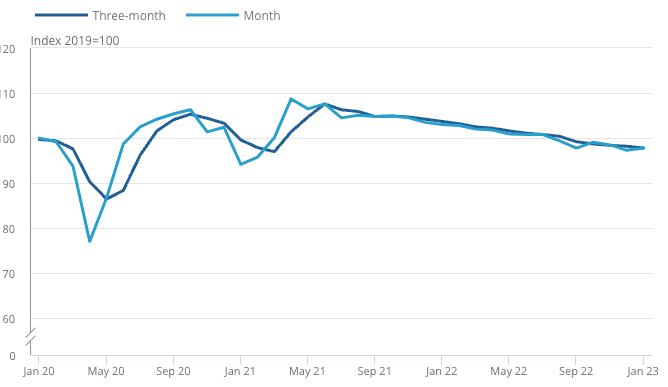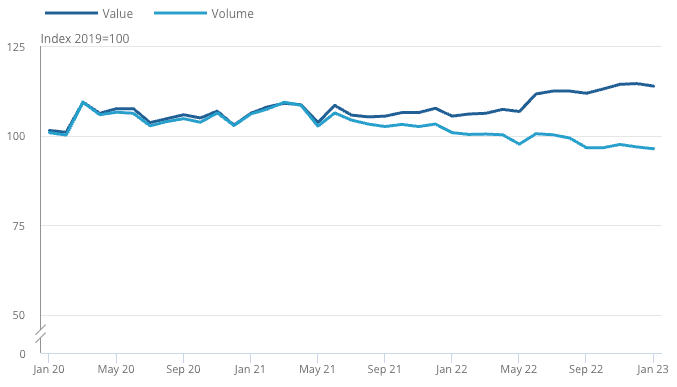UK Retail Sales in Unexpected Rise in January
- Written by: Gary Howes

Above: "Retail sales volumes continue a downward trend since summer 2021" - ONS. Chart: volume sales, seasonally adjusted, Great Britain, January 2020 to January 2023. Source: Office for National Statistics – Monthly Business Survey, Retail Sales Inquiry.
UK retail sales unexpectedly rose in January as UK consumers continue to spend, with one analyst saying the economic picture is "looking a lot less grim".
The ONS said retail sales volumes increased by 0.5% in January 2023, following a fall of 1.2% in December 2022, beating expectations for a reading of 0%.
Despite the rise, sales volumes fell by 0.9% in the three months to January 2023 when compared with the previous three months. Sales were down 5.1% year-on-year in January, better than the -5.5% expected by markets.
The stronger-than-expected outcome was predicted in a report published by Pound Sterling Live on Thursday.
"The increase in retail sales figures in January suggests that, while the UK consumer may not be feeling flush with cash, they are still spending. Consumer spending appears to be holding up, at least for now, despite the economic headlines," says Charlie Huggins, Head of Equities at Wealth Club.
There was no discernable reaction in the value of the Pound to the data, given the Bank of England's focus on wage and inflation data; the latest editions of both came out of the ONS this week.
Although retail sales have not had any significant near-term impact on the Pound, new research from Bank of America shows the health of the consumer matters greatly for the UK economy and currency.
The trend in sales remains one of weakness as consumers remain under pressure amidst rising inflation, pointing to ongoing underperformance by the Pound in 2023, according to Bank of America.
The better-than-expected figures nevertheless offer some signs of resilience.
"The economic picture is looking a lot less grim than in the Autumn, following the disastrous mini-budget," says Huggins. "That said, it is far too early to declare victory. With inflation still eating into consumers’ pockets and many people yet to refinance their mortgages, pressure on retailers could build over the coming months."
The ONS said food sales were down 0.2%, but non-food sales were up 0.2%, fuel sales were up 0.2% and non-food retailing up 0.3%.
Inflation meanwhile continues to keep the nominal value of retail sales elevated, even as consumers are buying less, as reflected in food store sales:
Above: "Food stores sales volumes continue to fall back" - ONS. Source: Office for National Statistics – Monthly Business Survey, Retail Sales Inquiry.
"Retail sales volumes grew in January by 0.5%, but sales value grew 0.6%. Meaning customers are buying less, and spending more. High inflation in essential categories (like food and household goods), is capturing a larger part of the share of wallets, leaving consumers with less to spend in more discretionary categories," says Carly Donovan, Associate Partner at McKinsey & Company.
Looking ahead, Sarah Coles, head of personal finance at Hargreaves Lansdown, says it's too soon to call a turnaround in the fortunes of the retailers: "it’s highly likely that this is just a bump in the slide that started back in summer 2021."
"Retail sales likely haven't hit a floor yet," says Samuel Tombs, Chief U.K. Economist at Pantheon Macroeconomics. January's partial recovery in retail sales should not distract from the dismal near-term outlook."
Tombs says working-age benefit recipients will not receive a £325 Cost of Living grant in the first quarter, while a pullback in government energy price support will mean that the typical household's monthly energy bill, after grants, will jump to £250 in April, from £142 currently, reducing household disposable income by 2.3%.
"In addition, a rise in mortgage interest payments this year looks set to subtract about 1.0pp from year-over-year growth in households’ real disposable incomes. Gradual job losses and heightened household saving also will weigh on retail sales," he adds.
But, there is some hope further out.
"The fall in wholesale energy prices since the end of last year, however, means there is now light at the end of the tunnel for retailers. Households should benefit from a substantial reduction in their energy bills in Q3, freeing up their money to spend on other goods and services. So after a further 1.5% fall between Q4 and Q2, we think retail sales in Q4 2023 will be similar to their levels a year ago," says Tombs.




